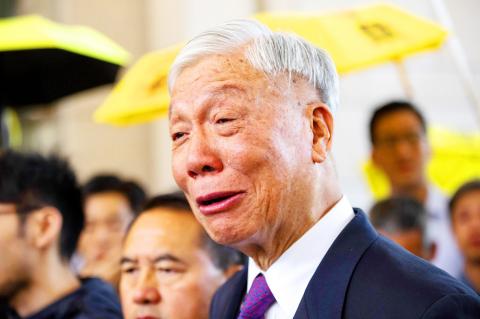Four prominent leaders of Hong Kong’s democracy movement were jailed yesterday for their role in organizing mass protests in 2014 that paralyzed the territory for months and infuriated Beijing.
The prison terms are the latest hammer blow to the territory’s beleaguered democracy movement, which has seen key figures jailed or banned from standing as legislators since their demonstrations shook the territory, but failed to win any concessions.
Earlier this month, nine democracy advocates were convicted of at least one charge in a prosecution that deployed rarely used colonial-era public nuisance laws over their participation in the “Umbrella movement” protests, which called for free elections to appoint the territory’s leader.

Photo: Bloomberg
Two key leaders of the mass protests — sociology professor Chan Kin-man (陳健民), 60, and law professor Benny Tai (戴耀廷), 54 — received the longest sentences of 16 months in jail, sparking tears in court and angry chants from hundreds of supporters gathered outside.
Two others — activist Raphael Wong (黃浩銘) and lawmaker Shiu Ka-chun (邵家臻) — received eight months, while the rest had their jail terms suspended or were given a community service order. One defendant, lawmaker Tanya Chan (陳淑莊), had her sentencing adjourned because she needs surgery for a brain tumor.
The jail terms are the steepest yet for anyone involved in the 79-day protest.
As Wong was led away by guards, he said: “Our determination to fight for democracy will not change.”
Tai and Chan founded a civil disobedience campaign known as “Occupy Central” in 2013 alongside 75-year-old Baptist minister Chu Yiu-ming (朱耀明), one of the defendants to have his jail term suspended.
“The long sentences send a chilling warning to all that there will be serious consequences for advocating for democracy,” Human Rights Watch senior China researcher Maya Wang (王松蓮) said.
Amnesty International said that the four jailed men were “prisoners of conscience” and that the record-breaking sentences set a “dangerous precedent.”
Carefully worded criticism came in from Western diplomats in the territory.
Washington’s consulate said that it was “concerned by the Hong Kong Government’s decision to bring these charges,” while Britain’s added that it would be “deeply concerning” if the jailings “were to deter the people of Hong Kong from participating in peaceful protest in the future.”
There were emotional scenes outside the courthouse as the four leaders were driven away in a prison van as supporters shouted: “Add Oil!” — a popular Cantonese phrase to signal encouragement.
Many supporters were holding umbrellas, an emblem of the 2014 protests after they were used by young demonstrators to defend themselves against police batons, tear gas canisters and pepper spray.
Speaking after the sentencing, Tanya Chan told the crowd: “I hope Hong Kongers will not lose hope, will not be afraid, will not have regrets or back down now.”

NATIONAL SECURITY THREAT: An official said that Guan Guan’s comments had gone beyond the threshold of free speech, as she advocated for the destruction of the ROC China-born media influencer Guan Guan’s (關關) residency permit has been revoked for repeatedly posting pro-China content that threatens national security, the National Immigration Agency said yesterday. Guan Guan has said many controversial things in her videos posted to Douyin (抖音), including “the red flag will soon be painted all over Taiwan” and “Taiwan is an inseparable part of China,” while expressing hope for expedited “reunification.” The agency received multiple reports alleging that Guan Guan had advocated for armed reunification last year. After investigating, the agency last month issued a notice requiring her to appear and account for her actions. Guan Guan appeared as required,

Japan and the Philippines yesterday signed a defense pact that would allow the tax-free provision of ammunition, fuel, food and other necessities when their forces stage joint training to boost deterrence against China’s growing aggression in the region and to bolster their preparation for natural disasters. Japan has faced increasing political, trade and security tensions with China, which was angered by Japanese Prime Minister Sanae Takaichi’s remark that a Chinese attack on Taiwan would be a survival-threatening situation for Japan, triggering a military response. Japan and the Philippines have also had separate territorial conflicts with Beijing in the East and South China

A strong cold air mass is expected to arrive tonight, bringing a change in weather and a drop in temperature, the Central Weather Administration (CWA) said. The coldest time would be early on Thursday morning, with temperatures in some areas dipping as low as 8°C, it said. Daytime highs yesterday were 22°C to 24°C in northern and eastern Taiwan, and about 25°C to 28°C in the central and southern regions, it said. However, nighttime lows would dip to about 15°C to 16°C in central and northern Taiwan as well as the northeast, and 17°C to 19°C elsewhere, it said. Tropical Storm Nokaen, currently

PAPERS, PLEASE: The gang exploited the high value of the passports, selling them at inflated prices to Chinese buyers, who would treat them as ‘invisibility cloaks’ The Yilan District Court has handed four members of a syndicate prison terms ranging from one year and two months to two years and two months for their involvement in a scheme to purchase Taiwanese passports and resell them abroad at a massive markup. A Chinese human smuggling syndicate purchased Taiwanese passports through local criminal networks, exploiting the passports’ visa-free travel privileges to turn a profit of more than 20 times the original price, the court said. Such criminal organizations enable people to impersonate Taiwanese when entering and exiting Taiwan and other countries, undermining social order and the credibility of the nation’s